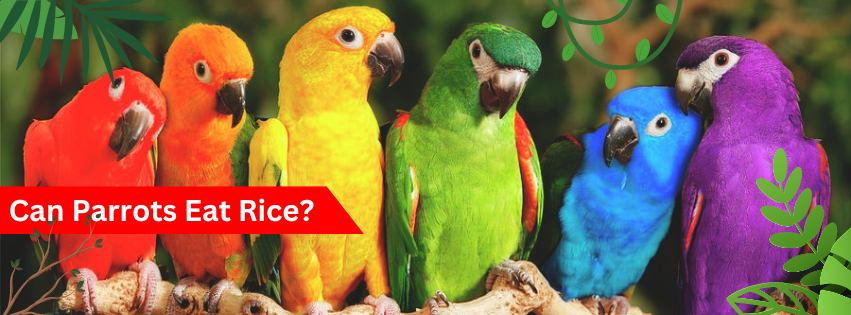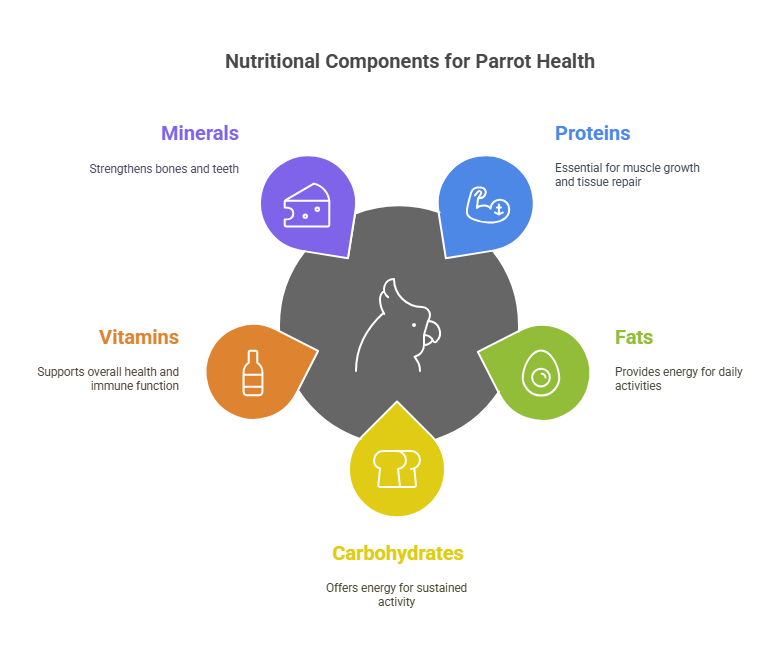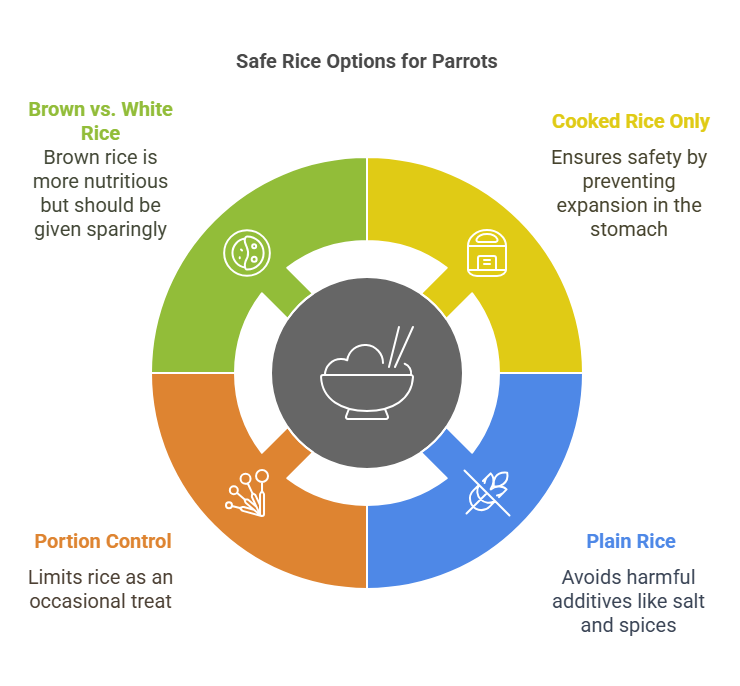Yes, parrots can eat rice, but there are a few important things to consider. Both cooked and uncooked rice can be offered to parrots, but cooked rice is generally safer and more nutritious for them.
Parrots are amazing, colorful creatures that make wonderful pets. As a responsible bird owner, one of the most important things to consider is their diet. You may wonder if certain foods are safe for your feathered friend. One common food that might come to mind is rice. Can parrots eat rice? Let’s dive deep into the topic and explore everything you need to know.
The Nutritional Needs Of Parrots
Before we address whether parrots can eat rice, it’s essential to understand what parrots need nutritionally. Parrots require a balanced diet to thrive. This includes a variety of seeds, fruits, vegetables, nuts, and pellets. Each food group offers a different set of nutrients that help keep them healthy.
Parrots need:
- Proteins for muscle growth and tissue repair.
- Fats for energy.
- Carbohydrates for energy.
- Vitamins like A, D, and E to support overall health.
- Minerals such as calcium and phosphorus for strong bones.
A diverse diet ensures that your parrot gets all the nutrients it needs to live a long, healthy life. Rice can be an occasional treat but should not make up a significant portion of their diet.
Understanding Parrots’ Digestive System
To determine whether rice is suitable for parrots, we need to understand their digestive system. Parrots are omnivores, which means they eat both plant and animal-based foods. Their digestive system is relatively short, but it’s designed to break down a variety of foods efficiently.
The process begins in the beak, where food is broken into smaller pieces. Then, food passes through the esophagus and into the crop. From the crop, food enters the stomach, where it is further digested. Parrots have a unique feature called a gizzard, which helps grind up food, including seeds and hard items, with the help of small stones they ingest.
Since rice is soft and easy to digest, parrots can typically process it without issue. However, it’s still important to offer rice in moderation, as too much could upset their balance of nutrients.
Exploring The Benefits And Concerns Of Rice For Parrots
Rice can have both benefits and concerns when it comes to feeding your parrot. Let’s take a closer look.
Benefits of Rice for Parrots
- Easily digestible: Rice is soft and gentle on the digestive system. This makes it easy for parrots to consume and process.
- Source of energy: Rice is high in carbohydrates, which provide a quick source of energy. Parrots, especially active ones, can benefit from this energy boost.
- Versatile food option: You can serve rice in various ways, such as plain or mixed with fruits and vegetables, to keep your parrot’s meals interesting.
Concerns of Rice for Parrots
- Lack of nutrients: While rice provides energy, it lacks many of the essential nutrients parrots need. Relying too heavily on rice can lead to nutritional deficiencies.
- High starch content: Rice is high in starch, which can contribute to weight gain if given too often.
- Possible digestive issues: Uncooked rice could expand in a parrot’s stomach, leading to discomfort. Always ensure the rice is cooked before serving.
Key Takeaway
Rice can be a safe, energy-boosting treat for parrots when given in moderation. However, it should not replace a well-rounded diet full of fruits, vegetables, seeds, and pellets.
Safe And Healthy Rice Options For Parrots
If you decide to offer rice to your parrot, it’s crucial to make sure it’s served in the safest way possible. Here are a few guidelines:
- Cooked rice only: Always serve rice cooked. Uncooked rice can pose a risk, as it could expand inside your bird’s stomach and cause issues.
- Plain rice: Never add seasoning, salt, or butter. Spices, salt, and other additives can be harmful to parrots.
- Limit portion sizes: Rice should only be a small part of your parrot’s diet. Offer it occasionally as a treat, not as a main meal.
- Brown rice vs. white rice: Brown rice contains more fiber and nutrients than white rice. It can be a healthier option for your parrot, but still should be given sparingly.
By following these guidelines, you can ensure that your parrot enjoys rice safely without compromising its health.
How To Introduce Rice To A Parrot’s Diet
Introducing any new food to your parrot’s diet should be done gradually. Parrots can be picky eaters, so it’s important to monitor their reactions closely.
Here’s how to introduce rice:
- Start with small portions: Offer a tiny amount of cooked rice, mixed with their regular food, to see how they react.
- Observe their reaction: Watch your parrot’s behavior after eating rice. If they seem to enjoy it, you can increase the portion over time.
- Mix with other foods: To make rice more appealing, mix it with fruits or vegetables that your parrot likes. This can help balance the nutrients.
- Frequency: Limit rice to once or twice a week, ensuring your parrot’s main diet remains balanced.
Balancing A Parrot’s Diet With Rice
Rice can be a fun and energy-packed treat for your parrot, but it shouldn’t take over their diet. To ensure that your parrot gets all the essential nutrients, balance rice with a variety of other foods.
A well-rounded parrot diet includes:
- High-quality pellets: These are formulated to provide the right balance of nutrients.
- Fresh fruits and vegetables: These are rich in vitamins, minerals, and fiber.
- Nuts and seeds: These provide healthy fats and proteins.
By offering a wide range of foods, you can ensure that your parrot gets all the nutrients it needs to stay healthy.
Understanding The Signs Of Rice Allergies Or Intolerance In Parrots
While rice is generally safe, some parrots might have an allergy or intolerance to it. Symptoms of rice allergies or intolerance can include:
- Diarrhea: A sudden change in stool consistency could indicate digestive issues.
- Vomiting: If your parrot starts vomiting after eating rice, it could be a sign of intolerance.
- Lethargy: If your parrot becomes unusually tired or inactive, it could be a sign that they’re having trouble digesting rice.
If you notice any of these signs after introducing rice to your parrot’s diet, stop offering it immediately and consult a veterinarian.
Alternatives To Rice For Parrots
If you’re concerned about rice or want to offer more variety, there are plenty of healthy alternatives for parrots. These include:
- Quinoa: A high-protein, nutrient-dense grain that’s a great rice alternative.
- Oats: A fiber-rich option that can be served cooked.
- Barley: A whole grain that provides plenty of fiber and nutrients.
- Sweet potatoes: Cooked sweet potatoes are rich in vitamins and provide a good source of energy.
These alternatives can offer similar energy-boosting benefits while providing more nutrients than rice.
Frequently Asked Questions About Parrots And Rice
1. Can I feed my parrot uncooked rice?
No, uncooked rice can expand in your parrot’s stomach, causing digestive issues. Always serve rice cooked.
2. How often can parrots eat rice?
Rice should be offered in moderation. Limit rice to once or twice a week to prevent any digestive or health issues.
3. Is brown rice better than white rice for parrots?
Yes, brown rice is a healthier option as it contains more fiber and nutrients compared to white rice.
4. Can rice cause obesity in parrots?
Rice is high in carbohydrates and can contribute to weight gain if fed in excess. Always offer it in small amounts.
5. What are some other healthy foods I can feed my parrot?
You can feed your parrot fruits, vegetables, high-quality pellets, seeds, and nuts for a balanced diet.
Conclusion
So, can parrots eat rice? Yes, parrots can eat rice safely, but only in moderation. Rice offers a good source of energy, but it lacks the essential nutrients that parrots need for optimal health. Always serve cooked, plain rice, and make sure it’s just one part of a well-rounded diet.
Remember, variety is key. Balance rice with other healthy foods to keep your parrot’s diet interesting and nutritious. If you notice any signs of allergies or intolerance, consult with a veterinarian. By following these guidelines, you can provide your parrot with a safe, healthy, and enjoyable diet.



